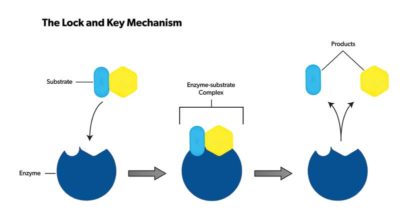When are enzymes added?

Enzymes can (and really should) be used primarily as a maintenance product in addition to the regular sanitizer and balancing efforts. Enzyme maintenance products are formulated to be administered in weekly doses (the dosage amount and product used is different for pools and hot tubs).
“Enzymes are a big part of our pool service success and I include them into the service process automatically because I know the client will be happy with the resulting water quality,” says Joe Koch of Blue Wave Pools in Audobon, NJ. “We add enzymes in to the pool on every service visit to help break down the non-living organics in the water so the filter doesn’t need to work as hard.”
When using an enzyme maintenance product weekly, pool professionals can actually take it one step further by splitting the dose up to daily feed amounts (this works well in commercial pools). Enzymes work while bathers are swimming, so think of it like cleaning up in the midst of a party. As non-living organics are being added to the water via bathers, enzymes can be used to break them down at any time, rather than waiting for them to buildup and cause filter problems, water clarity issues, or stains along the waterline.
“I always suggest the use of enzymes on a weekly basis—from pool opening to closing,” says Rullo. “I have been offering these products for more than 13 years and I wouldn’t have as many happy customers without the use of enzymes to clarify water.”
Corney also points out to his customers that enzymes should be added at least six hours after shocking their pool. If they are added too soon, there is a risk the shock will reduce the effectiveness of the enzymes.
“We prescribe our customers a custom water maintenance formula in which we instruct them to shock on day one and introduce the enzymes on day two,” explains Corney.
Enzymes can also be used in a pool or hot tub as a problem-solving product. In extreme cases, such as vandalism (or other accident), enzymes have saved the day. For example, they can even break down motor oil.
“We had a situation a few years ago at a commercial pool in which there was an old chemical feed pump and the diaphragm of the pump had an oil fill chamber that was leaking,” explains Koch. “Unfortunately, the feed pump was mounted on top of the chlorine vat and no one realized the oil was dripping into the chlorine vat… obviously not a great installation and one which we did not do ourselves. But the facility called us when they opened the pool and discovered the oil all around the surface of the pool water. We went in that evening and administered a lot of enzyme products and by morning, 95 per cent of the oil had dissipated.”
With this in mind, one can see how commercial pools can benefit from the use of these products, says Koch.
“For our commercial pool accounts, we put the enzyme on a metered feed so the pool gets a small dose seven days a week,” he says. “Not only does this keep the water clear, but because enzymes break down non-living organics so they don’t turn into smelly byproducts like chloramines.
“Enzymes are particularly effective in large outdoor commercial pools that are filled with the sweat, body oils, and sunscreen from bathers, in addition to being exposed to a lot of wild animal waste. The patrons of the pools always comment how the water feels nicer when the water is treated with enzymes.”
Facility managers are a bit apprehensive at first because of the cost of using enzymes, but many quickly change their minds and find room in their budgets after they see how the filters work more efficiently, the chloramine odour disappears, and the water clarity improves.







Thank you profusely for this scientific article . There are many lessons to derive and put them into operation . I wish that this magic solution will be available in Iran .
I do appreciate your time and support,
Sincerely,
Roohollah